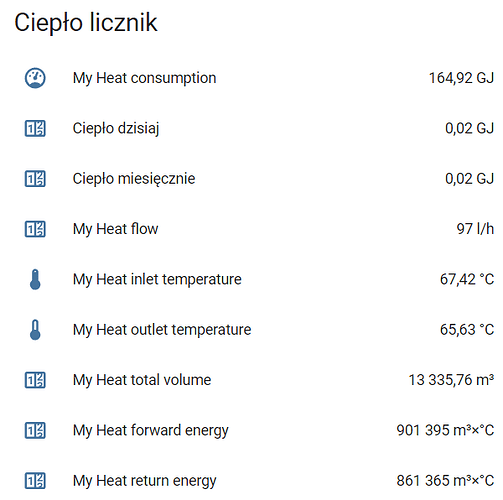Cześć @_Szczepan dziękuję bardzo za wskazówki!
Rzeczywiście mój licznik nadaje w C1 mode B.
Dodałem obsługę tego formatu (pewnie w ograniczonym zakresie - tak żeby działało dla mojego przypadku).
To pociągnęło za sobą kilka innych modyfikacji - inna interpretacja długości ramki (L-field), inny sposób szyfrowania danych (AES CTR). Ale w końcu udało się dobić do brzegu z dobrym rezultatem:
Wszystkie zmiany są dostępne w mojej kopii Twojego repo:
Pozdrawiam!
PS
Wrzucam jeszcze konfigurację YAML:
- platform: wmbus
# Meter ID (usually from sticker). Can be specified as decimal or hex.
# only hex is working for my watermeter !
# see: https://github.com/SzczepanLeon/esphome-components/issues/6
# edit watermeterid in the secrets file
## add_prefix settings to add the watermeterid to the lqi, rssi and total_water_m3
meter_id: !secret heatmeterId1
mode: T1C1
type: kamheat
key: !secret heatmeterId1key
add_prefix: false
# The LQI value reported by the CC1101 is a 7 bit unsigned number with a range from 0 to 127.
# Note that a lower value indicates a better link.
# The LQI of a received packet will be bad (higher number) when there is lot of interference.
lqi:
id: my_heat_cc1101_lqi
name: "My Heat meter LQI"
entity_category: "diagnostic"
unit_of_measurement: "lqi"
state_class: "measurement"
# The RSSI value reported by the CC1101 is a 8 bit signed number with an effective
# range from -138 dBm to -10.5 dBm when the CC1101 is operating around 868 MHz.
# RSSI stands for received signal strength (power) indication (in dBm).
# A higher value indicates higher power. (internal only)
rssi:
id: my_heat_cc1101_rssi
name: "My Heat meter RSSI"
unit_of_measurement: "dBm"
entity_category: "diagnostic"
# get the total energy in GJ from the wmbus telegram
total_energy_consumption_gj:
name: "My Heat consumption"
id: my_heat_consumption
unit_of_measurement: "GJ"
state_class: total_increasing
device_class: "energy"
accuracy_decimals: 2
icon: mdi:gauge
# get the forward energy in m2*C from the wmbus telegram
total_forward_energy_m3c:
name: "My Heat forward energy"
id: my_heat_forward_energy
unit_of_measurement: "m³×°C"
state_class: total_increasing
device_class: "energy"
accuracy_decimals: 0
icon: mdi:counter
# get the return energy in m2*C from the wmbus telegram
total_return_energy_m3c:
name: "My Heat return energy"
id: my_heat_return_energy
unit_of_measurement: "m³×°C"
state_class: total_increasing
device_class: "energy"
accuracy_decimals: 0
icon: mdi:counter
# get the total volume in m3 from the wmbus telegram
total_volume_m3:
name: "My Heat total volume"
id: my_heat_total_volume
unit_of_measurement: "m³"
state_class: total_increasing
device_class: "volume"
accuracy_decimals: 2
icon: mdi:counter
# get current flow in l/h from the wmbus telegram
volume_flow_lh:
name: "My Heat flow"
id: my_heat_flow
unit_of_measurement: "l/h"
state_class: "measurement"
accuracy_decimals: 0
icon: mdi:counter
# get current temperature at inlet in Celcius from the wmbus telegram
flow_temperature_c:
name: "My Heat inlet temperature"
id: my_heat_temp_in
unit_of_measurement: "°C"
state_class: "measurement"
device_class: "temperature"
accuracy_decimals: 2
icon: mdi:thermometer-high
# get current temperature at outlet in Celcius from the wmbus telegram
return_temperature_c:
name: "My Heat outlet temperature"
id: my_heat_temp_out
unit_of_measurement: "°C"
state_class: "measurement"
device_class: "temperature"
accuracy_decimals: 2
icon: mdi:thermometer-low
PPS
Dodałem sprawdzanie CRC bo ~2x na dobę zdarzały się błędne odczyty.
